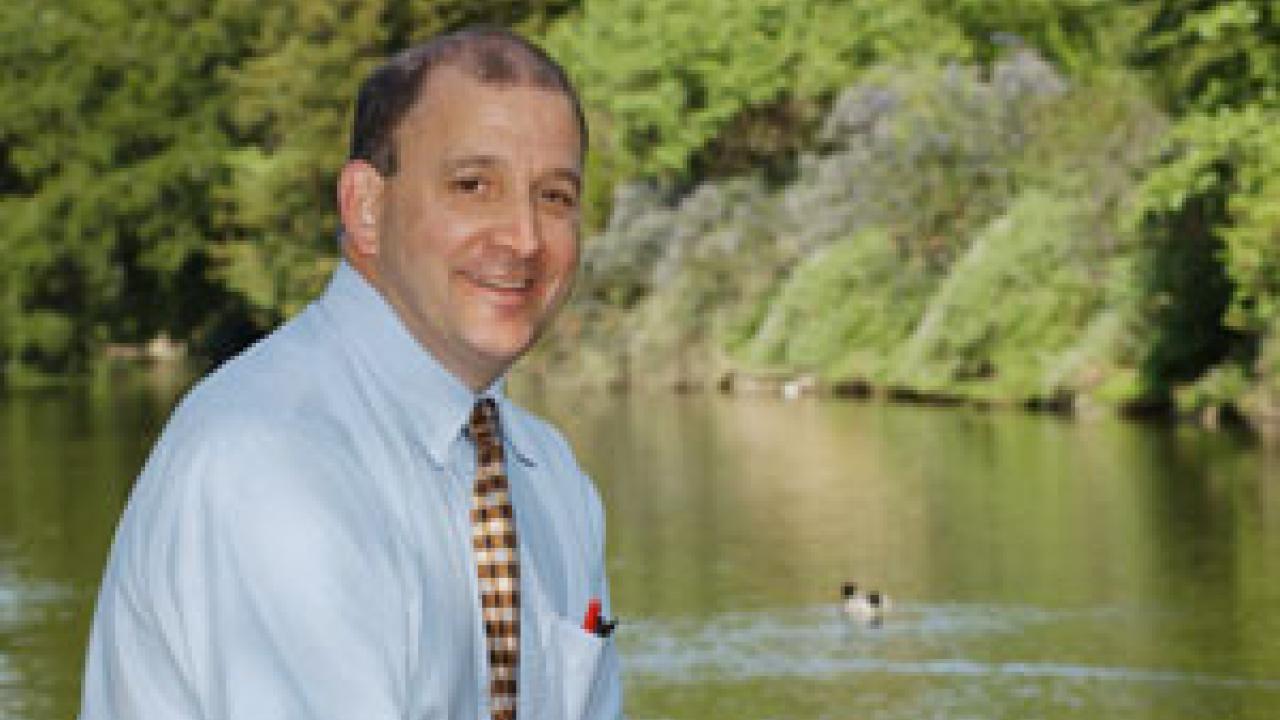Fly-fishing keeps reeling in Michael Parrella. An entomologist and associate dean of agricultural sciences in the College of Agricultural and Environmental Sciences, he says fly-fishing attracts people who enjoy the thrill of the sport at a deep level.
"Fly-fishing is more than just catching fish," says Parrella. "It's part of the bigger picture, from how you present the fly to understanding what a trout looks for in prey. It's a consuming passion to outsmart and snare one of these majestic fish."
When Parrella stands in waders and whistles a line back and forth three times before landing the fly upstream to where trout might be hiding in the ripples, it reminds him of where he grew up in New Jersey and how his father used to take him fishing.
"My father got me hooked on fishing," says Parrella, "and now that's evolved into fly-fishing."
Parrella currently teaches a group-study course, "Entomology for Fly-Fishers," through the Department of Entomology. Entomology 198 is designed to provide students with an understanding of aquatic insects, stream ecology and the art and science of fly-fishing.
Parrella and his family live on a 3-acre parcel west of Davis. The property has about 20 fruit trees, a horse, one goat, three sheep and 20 chickens.
"I think the kids like to pick the fruit and work/play with the animals," said Parrella. "And it's helped them understand agriculture, and that's important."
Getting the message out about agriculture is one of Parrella's chief duties back in the office. "My main focus is to work at reducing pesticide usage in California through safe and effective alternatives," says Parrella, who oversees much of the research in the Agricultural Experiment Station across the college.
His research interests include the development of integrated pest management strategies on ornamental plants with an emphasis on biological control. His laboratory has played a fundamental role in advancing pest management and biological control strategies in the floriculture industry, and he has trained numerous researchers in prominent floricultural entomology positions across the country.
Beyond his associate dean role, Parrella also holds appointments in the departments of entomology and environmental horticulture. He earned a bachelor's degree in animal science from Rutgers University and received his master's and doctorate in entomology from Virginia Polytechnic Institute.
Why did you choose a career in entomology?
I've always been fascinated by insects since I was young. Their abundance, diversity and adaptability are astounding. You see insects everywhere you go on this planet.
What's the biggest issue in your field today?
I work with growers to reduce pesticides through biological controls, such as insects that feed on the types of insects that cause crop damage. I get a real charge when we contribute to making positive changes in how California produces agricultural goods.
What do you like most about your job?
It's intellectually stimulating. We have extremely bright, passionate and talented people all over this campus and in the college. They are committed to their research and teaching, as well as extension and outreach work. In this job you quickly feel like you're making a contribution at many different levels.
And the least?
There seems to be a state bias against agricultural research. Yet, by all indicators and measures of excellence, UC Davis has been an extremely productive agricultural entity through the years, and it's something not to be taken for granted when we think about the food and beverages we put on our tables and feed to our children.
It's important that California agriculture remain on the technological cutting edge. We must either be the most efficient producers of raw agricultural products in the world or we must add value to our products so that we capture a differentiated market. Much depends on the research of the Agricultural Experiment Station, which is directly partnered with the research, education and outreach functions of Cooperative Extension -- organizations that continue to face large budget cuts.
What's something surprising about you that people don't know?
I serve as a Little League umpire -- last year I was the head umpire for Davis Little League. It's one way to contribute to my son's playing ball. The hardest aspect is that so few people really know the rules of the game, so we take extra steps to run clinics and help our volunteer umpires master the process.
Also, there are not many people who have been promoted twice to full professor. I started at UC Riverside and worked my way up to full professor, and then accepted a position at UC Davis as an associate professor where I climbed the ladder to full professor once again.
Read any good books lately?
I love science fiction. I'm reading David and Leigh Eddings' The Elder Gods, the first book in the four-book Dreamers Saga. I've also enjoyed all the Lord of the Rings books as well as The Chronicles of Thomas Covenant, the Unbeliever trilogy, by Stephen Donaldson.
What are some of your most treasured possessions?
I have more than 50 different rods and reels, some of which were my father's. These are all very special to me. I'm also fascinated by how computers are morphing into home entertainment centers, including surround-sound and digital video. I am one of the Macintosh Faithful and try to stay abreast of all their latest technology, as much as my budget will allow.
What's your guilty pleasure?
I've been a subscriber to Rolling Stone magazine since 1969. I try to keep contemporary in the rock 'n' roll scene, even check on what my kids are listening to. I harken back to bands like Yes, Styx and Bruce Springsteen. •
